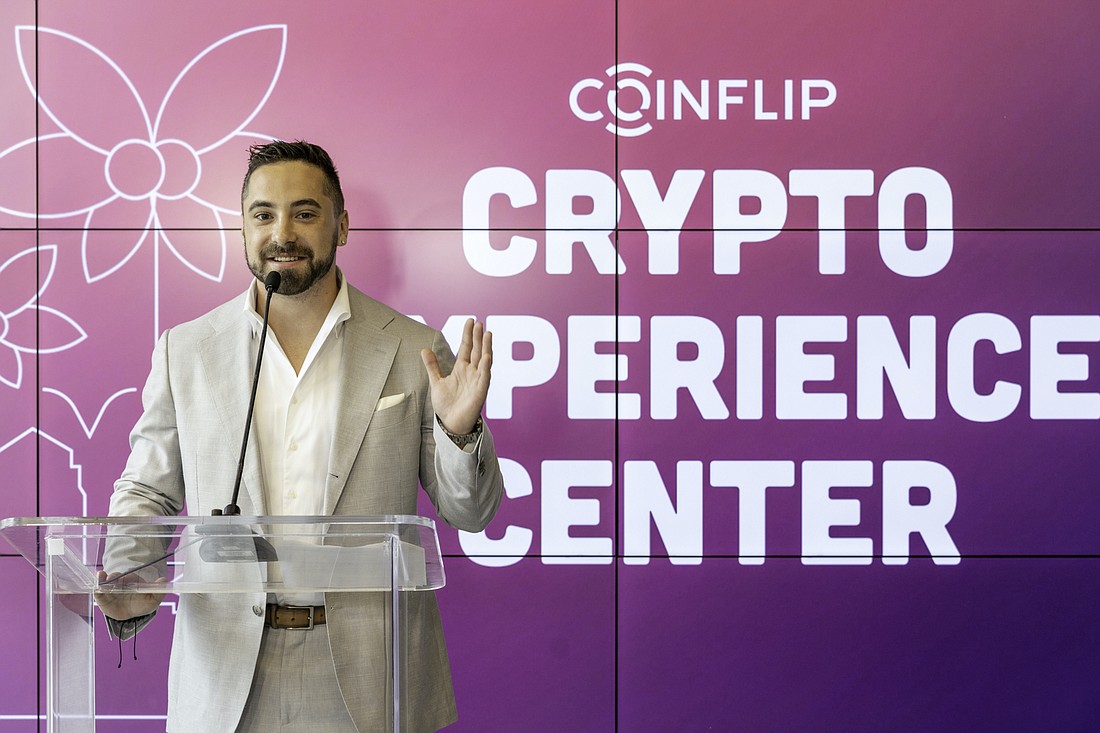- January 11, 2025
-
-
Loading

Loading

Ben Weiss, the Chicago-based CEO and co-founder of CoinFlip, which recently expanded into Tampa, remains bullish about the cryptocurrency industry — despite the recent spectacular collapse of FTX. Weiss, for one, believes more regulations will soon add structure to the Wild West vibe of crypto, and the strongest companies will survive. (CoinFlip, says Weiss, does not rely on FTX, a crypto exchange, for its business operations.)
CoinFlip is a fintech company powered by cryptocurrency with an 8,000-square-foot innovation center and office near downtown Tampa. It has about 4,000 bitcoin ATMs in the U.S. and Canada where people can buy, sell and access crypto. The Tampa office is its second in the country.
One of its main objectives with the office is to demystify crypto and, as Weiss said at its September grand opening “take crypto out of the cloud and make it physical. And tangible.”
“While times may feel uncertain, regulation will take shape and strong businesses that can support consumers will persevere.” Ben Weiss, CEO and co-founder of CoinFlip.
While a noble goal, the uncertainty wrought by the recent news of industry bankruptcies and collapses has led some investors and commentators to wonder if the promised future is just a mirage.
This mostly began with news in early November that FTX, an industry leader and one of the faces of cryptocurrency, had collapsed and would file for bankruptcy, potentially costing investors billions. The Business Observer recently spoke to Weiss via email about how the FTX crisis impacts both his business and the crypto industry. Edited excerpts:
How has FTX’s collapse impacted how CoinFlip does business?
The collapse hasn’t impacted CoinFlip’s business because we handle operations differently from some of our competitors. Unlike crypto exchanges like FTX, we don’t hold customer assets. We advise our customers to use non-custodial wallets to hold their funds, meaning they belong to them and not on the blockchain or held by a company. As a registered money services business, we take our regulatory obligations very seriously — with customer safety as our top priority. While the news cycle has made the crypto landscape seem grim, CoinFlip is still experiencing tremendous growth.
How do incidents like what happened at FTX affect what CoinFlip is trying to do to make crypto more accessible and safer? How do you get that message across when a company like FTX’s problems are so highly publicized?
I’ve always said downturns can define an industry and give the opportunity for legitimate businesses to prevail. Despite market conditions, crypto is still the top performing asset of the last 10 years, and while times may feel uncertain, regulation will take shape and strong businesses that can support consumers will persevere and continue to grow. CoinFlip is in favor of education, as evidenced by its Crypto Experience Center in Sparkman Wharf (in Tampa) which serves as a space to inform the community about cryptocurrency and provide guidance around purchasing digital currencies.
What is CoinFlip doing to protect itself from future issues in the cryptocurrency industry? What lessons are you learning from what others are going through?
Our business model is different from some of our competitors in that we are less exposed to market volatility. That said, we are extremely proud of our risk mitigation strategies and will continue to evaluate ways to ensure consumer protection. We are incredibly intentional with our business and treat our responsibilities seriously. We will continue to educate consumers on the importance of self-custodial wallets and doing your own research to keep your investments safe. Lastly, we support additional regulatory clarity that holds companies accountable while not hindering opportunities for innovation.